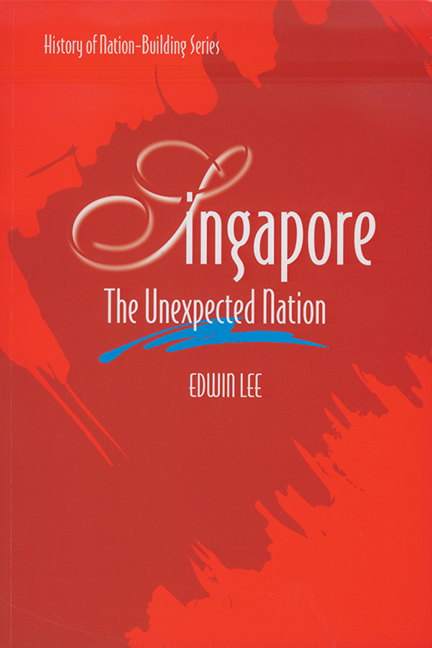Book contents
- Frontmatter
- Dedication
- Contents
- Preface
- Introduction by Wang Gungwu
- Chapter One Beginnings: From Temasek to Singapore
- Chapter Two Race, History and Nationalism
- Chapter Three Contestants and Contesting Visions
- Chapter Four The Accidental Chief Minister
- Chapter Five The Terminal Chief Minister
- Chapter Six The Embattled Prime Minister
- Chapter Seven Merger: Contesting Ownership and Principles
- Chapter Eight Terms of Disendearment
- Chapter Nine Dare to be Equal
- Chapter Ten The Way to Survive
- Chapter Eleven National Service: The Price of Independence
- Chapter Twelve Politics of Education
- Chapter Thirteen Home Ownership, National Stability and the New Middle Classes
- Chapter Fourteen University and Nation
- Chapter Fifteen Toh's Nation-Building Thrust
- Chapter Sixteen Nantah: Between Community and Nation
- Chapter Seventeen Self-Renewal: Talents for a Tough Act
- Chapter Eighteen The Consensual Prime Minister
- Chapter Nineteen Confucianism, Christianity, Chineseness
- Chapter Twenty Singapore Dreams, Singapore Dilemmas
- Chapter Twenty-One The Hyphenated Singaporean
- Chapter Twenty-Two The Unexpected Nation
- Bibliographical Note
- Index
- The Author
Preface
Published online by Cambridge University Press: 21 October 2015
- Frontmatter
- Dedication
- Contents
- Preface
- Introduction by Wang Gungwu
- Chapter One Beginnings: From Temasek to Singapore
- Chapter Two Race, History and Nationalism
- Chapter Three Contestants and Contesting Visions
- Chapter Four The Accidental Chief Minister
- Chapter Five The Terminal Chief Minister
- Chapter Six The Embattled Prime Minister
- Chapter Seven Merger: Contesting Ownership and Principles
- Chapter Eight Terms of Disendearment
- Chapter Nine Dare to be Equal
- Chapter Ten The Way to Survive
- Chapter Eleven National Service: The Price of Independence
- Chapter Twelve Politics of Education
- Chapter Thirteen Home Ownership, National Stability and the New Middle Classes
- Chapter Fourteen University and Nation
- Chapter Fifteen Toh's Nation-Building Thrust
- Chapter Sixteen Nantah: Between Community and Nation
- Chapter Seventeen Self-Renewal: Talents for a Tough Act
- Chapter Eighteen The Consensual Prime Minister
- Chapter Nineteen Confucianism, Christianity, Chineseness
- Chapter Twenty Singapore Dreams, Singapore Dilemmas
- Chapter Twenty-One The Hyphenated Singaporean
- Chapter Twenty-Two The Unexpected Nation
- Bibliographical Note
- Index
- The Author
Summary
The Second World War sealed the old era of British rule in Malaya, and opened a new final chapter. The new men who ruled Malaya came out with liberal, Fabian ideas of colonial stewardship. They aimed to remake Malaya into a unified multiracial country, a Malayan Malaya, to which they would eventually transfer power. But they had not reckoned with how Malaya would receive them. Malay nationalists opposed them, forcing them to put Malay sovereignty and Malay rights first, though agreeing to the unification of all the Malay states in a new Federation of Malaya. Then, the Malayan Communist Party, Britain's Chinese ally behind Japanese lines in the war just ended, edged towards a war of insurgency in the uneasy peace-time. Concurrently, the British officials who started as liberals switched to advocating draconian laws. However, successive British proconsuls worked to keep the Malayan Malaya ideal alive until they had to accept defeat not by the guns of communism but by the politics of communalism.
The young Lee Kuan Yew has his political education in this war-torn, troubled period, but from Britain where he was reading law after the war. His thinking was cast in the same liberal mould as the British political and colonial establishment. He arrived at a definition of the Malayan nation that mirrored theirs. Something else very important that Lee grasped very early was that Britain had no intention to leave Malaya in the hands of the Malayan Communist Party. Lee, like a group of young, highly intelligent radicals who came slightly before him, was also to work with the communists, but unlike them, who were drawn like moths to the flame, he reserved some space, playing on the ambiguity in the connection. And the connection enabled him to beat his right wing contemporaries, helped by their own wrong moves. It also helped Lee that the state of play developed such that, ironically, both the British and the Malayan Communist Party had to take him as the only man who could further their cause. Later still, Tunku Abdul Rahman, the father of independence in Malaya, had also to deal with none other than Lee, as one prime minister (of Malaya) to another (of Singapore).
- Type
- Chapter
- Information
- SingaporeThe Unexpected Nation, pp. ix - xivPublisher: ISEAS–Yusof Ishak InstitutePrint publication year: 2008

